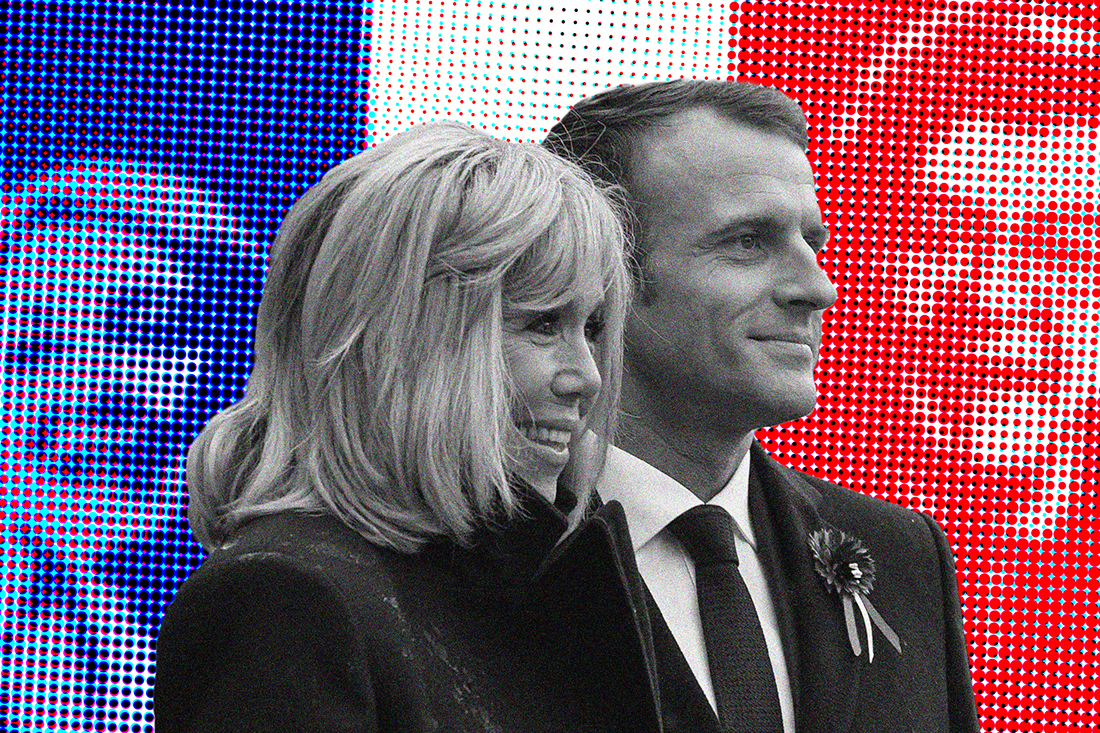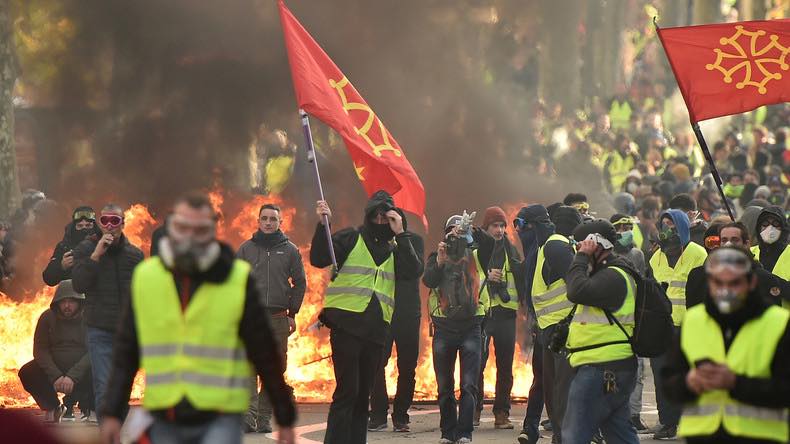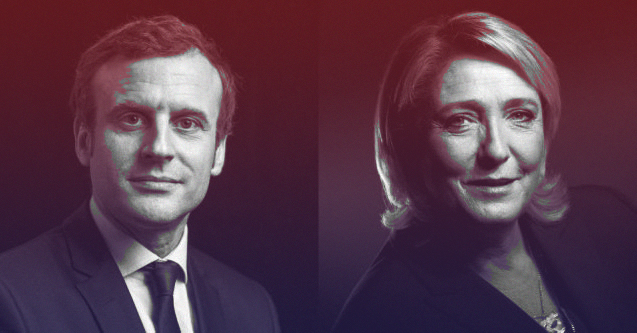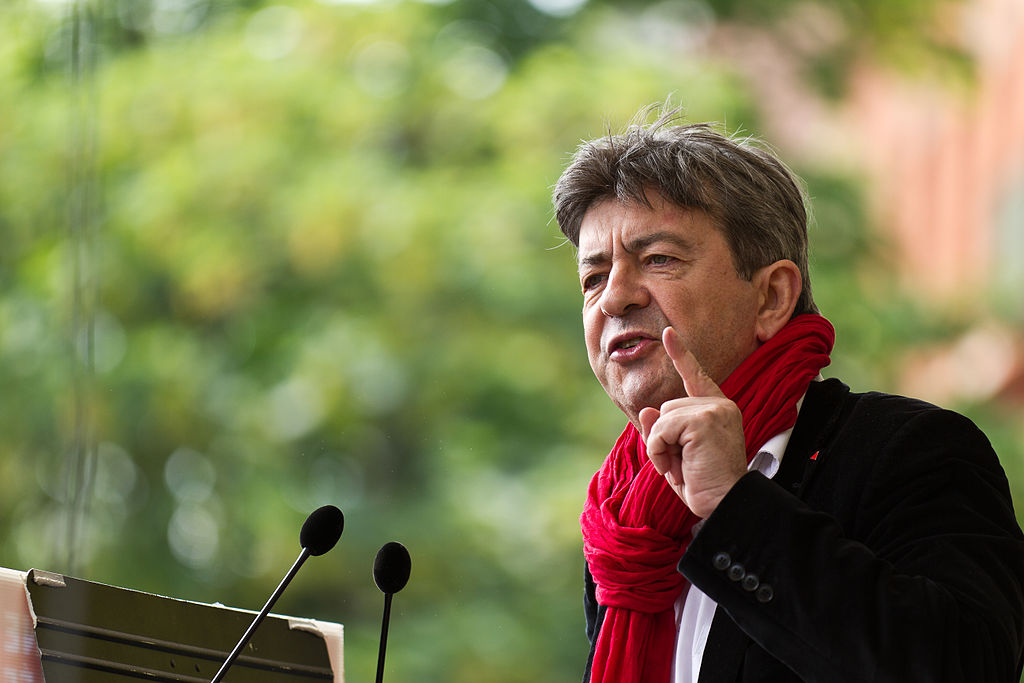
Quel spectacle! What a show we had as the exit polls indicated that Macron had won the presidential elections. He walked through the streets of Paris hand in hand with his wife, and accompanied by a group of young people, apparently an indication of the generations that will support him in the future. And in his speech, he announced that he was no longer “le candidat” but the “President of all the French”. How hollow all this must sound to the huge majority of French workers and youth who did not vote for him and hate him with a passion.
As the results came through one could sense the calming of the nerves in the company boardrooms, not just in France but across Europe and beyond. As the Financial Times commented, “A sigh of relief from France’s European and NATO allies was heard after Emmanuel Macron won a convincing victory over his far-right challenger Marine Le Pen in the final round of the presidential election on Sunday. France’s status as a linchpin of the EU and a strong contributor to NATO in its support for Ukraine against Russia has been secured for another five years…”
The messages of congratulations from presidents and prime ministers poured in. European Council President Charles Michel, expressed his joy: “Bravo Emmanuel. In this turbulent period, we need a solid Europe and a France totally committed to a more sovereign and more strategic European Union.” Boris Johnson applauded the result. European German Finance Minister Christian Lindner announced that the biggest winner was Europe. Italian Prime Minister Mario Draghi, said the re-election was “wonderful news for all of Europe.”
As Reuters commented, “European Union leaders were quick to congratulate French President Emmanuel Macron on his election victory over his far-right rival on Sunday, reflecting relief that one of the bloc’s most pivotal countries had avoided a political shock.” And Central Bank President Christine Lagarde also expressed relief, saying “strong leadership is essential in these uncertain times.”
Macron is no “President of all the French people”
When one sees such an outpouring of both relief and support from the main political representatives of the capitalist class across Europe, it is a clear indication that Macron is not at all the “President of all the French people”. He is the man of the banks, of the French multinational corporations, he is “the President of the rich” as many people in France see him.

So how was he able to win a second term? His record in office is not good from the point of view of millions of French workers, of French youth. Back in 2017, he promised to “work for everyone”. By everyone he clearly meant all the rich! His aims were to boost investment and build a “new growth model”. What this meant in practice was massive cuts in public spending, part of which involved reducing the number of government workers by tens of thousands. He also came into office with the aim of increasing so-called workplace “flexibility”, i.e. attacking workers’ rights.
He carried out policies that hit working people, among them the constant and relentless attack on pensions, with the aim of forcing French workers to work longer before they can retire. Such was the hatred felt towards this man of finance capital, that we saw that huge and widespread expression of anger expressed by the Gilets Jaunes, the Yellow Vests movement, within one year of him coming into office.
We are now being told that the “centre ground” won, that the French people seek moderation and peace. But that is completely false. The old centre ground has all but disappeared, as can be seen in the results of former powerful forces such as the Socialist Party and the Republicans, the two main pillars of the French political system that provided most of France’s presidents in the post-war period. They did so badly that they failed to even achieve the 5% threshold that guarantees state funding for their election campaign costs!
Growing anti-establishment moods
The results of this two-horse race, in fact, hide the real situation on the ground. The real balance of forces in France was expressed during the first round, and it is worth looking at those results to bring out what is really happening in France.
Those results show that Macron won just under 28% of the votes cast. But 28% of the electorate did not bother to vote, and if we add the blank and spoiled ballot papers, the figure reaches 34%. We then saw the highest level of abstentions for the second round of a presidential election in more than 50 years. In the past, the level of electoral participation was much higher, well above 80% and even hitting the highs of 87.3% in 1974 and 84% in 2007. Now we see the growing disaffection with all the political parties on the part of a significant section of the population.
Therefore, Macron’s real active support (what he received in the first round) is just barely 20% of the total electorate of France, confirming that the big majority in France do not at all see him as “their President”. The levels of abstention among those under the age of 35 in the first round were even higher, exceeding 40%, up on the previous presidential elections, where around one third abstained in this age group. Far from being the President of the future generations, the youth detest Macron.

What we saw in the first round was precisely the opposite of what the media are trying to sell to us now. Rather than national unity what we have is a clear process of polarization of society to the left and to the right, and a generalized mistrust of the establishment. Rather than social stability, this indicates a growing instability, which will reveal itself in the coming period.
Prior to the second round Pascal Lamy, Director-General of the WTO from September 2005 to August 2013, and before that European Commissioner for Trade, in an interview with the Financial Times, expressed deep concerns at the fact that around 57% of the electorate had voted for what he referred to as either far-right or far-left parties. He can see the real social divide that exists in France, and he also expressed his deep concerns, saying he had never seen such a worrying situation in terms of the state of the world economy.
This was the voice of a serious representative of the French and European bourgeois. The fact is that the second round could have been very different – it could have been a run off between the Left and Macron. Only a handful of votes tipped the balance in favour of Le Pen. She won 23.2% of the votes [barely 16% of the total electorate] and could have been beaten by Mélenchon, who won 22% of the vote, had the left presented a single candidate. The combined votes of the Communist Party and two smaller left formations (the New Anticapitalist Party and Lutte Ouvriere) came to 3.7%. Had these stood down and called on their supporters to vote for Mélenchon, Macron may have been making a very different speech last night.
On the right Le Pen also shouted victory last night, and indeed compared to previous elections she did much better. If we consider that back in 2002 her father, Jean-Marie Le Pen lost to Chirac in the second round 82% to 18%, and that more recently, in 2017, Marine Le Pen lost to Macron 66% to 34%, yesterday’s 42% can be seen as a big improvement. This result, however, also hides what is really going on.
Two bourgeois candidates
Due to the failure of the left, the French electorate was presented with two bourgeois candidates, one the hated man of the rich, the so-called liberal, and the other a racist nationalist with a reputation for whipping up anti-immigrant sentiment. The irony of this of course is that Macron has actually carried out anti-immigrant policies himself. In the 2017 election campaign, he promised to strengthen the number of border guards, to make it more difficult for immigrants to gain French nationality, and to immediately repatriate failed asylum seekers. So much for the man of “reasonable, decent, civilized” France!
Faced with this choice, many either abstained or voted holding their noses. There were many interviews prior to the second round, especially with young people, who said they would either not vote or vote for the least bad of the two candidates. In fact, more people abstained (13.6 million) than voted for Le Pen (13.3 million). Additionally, as we have seen, over three million (8.5%) people who did go to vote, decided to spoil their ballots or vote blank.
We also have to look more closely at those who voted for Le Pen. Among these, there was a layer that voted against Macron, rather than for Le Pen – in the same way that many voted against Le Pen, rather than for Macron. Le Pen was conscious of this and shifted the emphasis of her election campaign more to issues that concerned working-class people, such as Macron’s plan to increase the age of retirement to 65 and the cost-of-living crisis. This would have resonated with many French voters.

In fact, an IPSOS opinion poll for Le Parisienne revealed how, amongst those who voted in the second round, Macron won amongst management layers and professionals, as well as amongst those who earn over 3,000 euros a month, while Le Pen won a majority amongst blue and white-collar workers, as well as amongst those who earn less than 1250 euro a month.
These electors could have been won by Mélenchon, but would never have voted for Macron. There was an abundance of interviews with ordinary working-class French people who said they had voted for Macron in 2017 but would never vote for him again! If Mélenchon had come out with a more fighting programme, and if the left had presented a united front, who can doubt that he could have defeated Macron in the second round? But of course, this did not happen, and we have to deal with the scenario as it presents itself now.
Macron is back in the driving seat, but he faces the parliamentary elections in June, which could go very differently for him. There it will not be the unpalatable choice of either a bourgeois liberal or a right-wing bourgeois conservative. The outcome of those elections will determine the make-up of the government Macron will have to rely on to achieve his “unprecedented shake-up of France’s welfare state”, as Reuters puts it.
Normally the newly elected president is capable of winning a majority in parliament as there tends to be a greater abstention among those who didn’t vote for him in the presidential elections. But considering the anger of the 57% who voted either for candidates to his right or his left, it is not a foregone conclusion that Macron would get the solid parliamentary majority he requires to push through his draconian programme. He could end up with a fragmented parliament, which would add to his evident lack of authority.
Ruling class commentators are very worried. Macron was supposed to usher in a new era of liberal politics. But in fact, he has destroyed the traditional parties of the right and the left on which the stability of the system was based, and now he has destroyed his own credibility, they say – which will make his task of gradually raising the age of retirement from 62 to 65, together with carrying out all the other anti-working-class policies more difficult. After the first round, where he faced a lot of anger over this question, he opportunistically promised that he would only raise it to 64, hoping to cut across Le Pen’s support. But now he will now move on and attempt to implement the programme the capitalist class demands of him.
The most turbulent period in French history is being prepared
This means that rather than peace and social stability, Macron’s second term in office will unleash an even bigger wave of discontent than his first term. Any immediate honeymoon period will be very short indeed, or non-existent. On top of the question of pensions, there is the cost of living. Inflation reached 4.5% in March, the highest since 1985, and the sky-rocketing prices of gas, electricity and fuel are hitting millions of ordinary working-class families across France. In an attempt to limit the effects of inflation, Macron placed a cap on energy prices, but all serious analysts are saying this is very costly and the government will have to lift them in the coming period.
In 2018, the rising price of fuel triggered the “yellow vest” rebellion. That was just a foretaste of what is to come in the next period. An indication of what we can expect to see were the protests of the youth that erupted immediately after the first round, when 20,000 came out onto the streets of Paris and the students occupied La Sorbonne university under the slogan “neither Macron, nor Le Pen”.
Macron’s second term as President is far from being the relief that the bourgeoisie was hoping for. In reality, France is entering one of the most turbulent periods of its history. The French workers and youth have great revolutionary traditions, from the 1789 revolution, to the 1871 Paris Commune, the 1930s occupations of the factories and the biggest general strike in history in May 1968. All those traditions will surface with a vengeance in the coming period.
But what will happen on the electoral front? It is evident to a child of six that Macron back in office will mean a further erosion of his electoral base. He will prepare the ground for an even sharper polarization of French society, both to the left and to the right. In these conditions Le Pen could actually win next time round and that would pose a serious problem for the French and European Establishment, to those nice ladies and gentlemen at the top. Le Pen in office could become a major destabilizing element within the European Union, seeking to place French national interests above those of their European partners.
The European bourgeois want to continue with their policy of dismantling the welfare state in all European countries, of privatizing what is left of state-owned property, of destroying the healthcare system in order to promote private interests, and generally destroy what little is left of the conquests of the working class in the past, but without the class struggle and social instability that all that entails. For now, their man is Macron.
Le Pen is no friend of the French working class, and if she were ever to gain office that would become abundantly clear. She would very quickly abandon any promises made to the French workers and would proceed to carry out more or less the same programme of Macron in terms of workers’ rights, public spending and so on, but it would be peppered with racist rhetoric and some anti-immigrant policies.
In the recent election campaign, sensing the angry mood among wide layers of working people today, she shifted her propaganda to questions such as pensions and inflation. One of her slogans was “Give the French their money back” and she promised to protect people from inflation and to cut taxes. Of course, she combined this with racist anti-immigrant vitriol. She talked of placing greater controls on immigration, of “economic patriotism”, “rational and reasonable” protectionism, of giving priority to French people in social housing and jobs, and she raised the idea of cutting benefits to immigrants, as well as banning the veil in public. Her message to the French was that the problems of France are due to the presence of too many immigrants, and that therefore to defend the interests of French workers those of immigrants must be curbed. Her aim is clearly to divide the French workers in the hope of weakening them as a force.
Her nationalism is also seen by the establishment as a threat to European capital. Her demands to protect French industry, to place French law above European Union laws, to withdraw from NATO’s central command, have raised concerns among the serious bourgeois commentators and among governments across Europe. France is a key player in the European Union together with Germany, and to see France go down a similar path embarked on by Boris Johnson in Britain, and before him by Trump in the United States, raised the prospect of the breakup of the cohesion at the top of the EU. That is what they feared from a possible Le Pen victory, but that danger has not been eliminated, it has merely been delayed.
Tasks before the French left
Polarization, however, does not mean that a victory of Le Pen is a foregone conclusion at the next Presidential elections. We saw how even today the Left in France could have won. It will continue to get stronger in the coming period. But its strength will not derive from any clever electoral machinations at the top – although a genuine united front of all the left would be an immense step forward.
There are now talks between the Communist Party and the NPA for a common strategy with Mélenchon’s FI at the legislative elections. That is a correct approach, and it is actually causing concern in Macron’s camp who can clearly see the potential threat from the left. However, it also beggars the question as to why these two smaller parties did not support Mélenchon in the first round of the presidential election? There is more than an element of opportunism in these overtures to unity now, as the smaller parties will have more difficulty getting any parliamentary representation if they go at it alone.

The strength of the left will come from the mobilizations of the workers and youth of France in the coming period. Blocked on the electoral front, the French working class will be forced to count on its own forces. We will see strikes and street protests, even factory occupations at some stage. We will see massive mobilizations of the youth on the streets and in the form of university occupations. What happened recently at La Sorbonne is just a small taste of much bigger events to come.
If Mélenchon were to adopt a genuine socialist programme, one of nationalizations under workers’ control, of expropriation of the banks and the big monopolies, he could explain to the French workers and youth that the resources for reducing the age of retirement, for providing decent wages for all, for providing housing for all, for providing for a fully funded public healthcare system are there.
This would cut across the racism and bigotry of Le Pen and would gather together all the workers in France in one united bloc to transform society from head to toe. It would also convince the millions who abstained to come out in support of such a programme. And it would inspire workers across the whole of Europe who are facing the same problems as their French brothers and sisters
Unfortunately, Mélenchon does not raise such a programme. He limits himself to seeking solutions within the confines of capitalism. If he continues down this road then he will contribute to the strengthening of the right wing.
In this situation our task is neither to laugh, nor to cry, but to understand. It is possible in France to build a powerful movement of the working class and youth, and to radically change society. But this depends on the leadership of the working class, which up till now has been found wanting. The Marxists are the only ones with the answers to the problems of the working class. The problem is that they are very small in numbers. The next period, however, provides very fertile ground upon which our ideas can grow, especially among the youth, but also among growing layers of the working class. Our immediate task, therefore, is to build up the forces of genuine Marxism and prepare the ground for the emergence of a powerful revolutionary current among the workers and youth of France. There is no other road!

